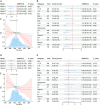Hyperuricemia reduces the risk of MCI but not dementia: a cross-sectional study in Liuyang
- PMID: 40166637
- PMCID: PMC11955452
- DOI: 10.3389/fneur.2025.1555587
Hyperuricemia reduces the risk of MCI but not dementia: a cross-sectional study in Liuyang
Abstract
Background: Cognitive impairments, including mild cognitive impairment (MCI) and dementia, significantly affect patients' daily functions and quality of life, contributing to a substantial societal and economic burden. The role of uric acid in cognitive function is controversial, with some studies suggesting protective effects, while others indicate increased risk of cognitive decline.
Methods: A total of 1,098 participants with an average age of 69 years were included in the study. Cognitive function was assessed using the Mini-Mental State Examination. Hyperuricemia was defined as blood uric acid concentrations >420 μmol/L. Logistic regression and restricted cubic spline analysis were performed to assess the association between hyperuricemia and cognitive impairment, including MCI and dementia.
Results: Hyperuricemia was associated with a lower risk of cognitive impairment (OR = 0.51, 95% CI = 0.31-0.80) and MCI (OR = 0.39, 95% CI = 0.21-0.69), particularly in individuals younger than 70 years, males, and those without hypertension or diabetes. No significant association was found between hyperuricemia and dementia (OR = 0.94, 95% CI = 0.44-1.89). There is no evidence of a non-linear relationship between hyperuricemia and cognitive impairment.
Conclusion: Hyperuricemia appears to have a protective effect on cognitive function, particularly in reducing the risk of MCI, but not dementia, in specific populations.
Keywords: cognitive impairment; cross-sectional study; dementia; hyperuricemia; mild cognitive impairment.
Copyright © 2025 He, Zhu, Bei, Xiang, Xi, Meng and Bei.
Conflict of interest statement
The authors declare that the research was conducted in the absence of any commercial or financial relationships that could be construed as a potential conflict of interest.
Figures


Similar articles
-
Hyperuricemia as a Protective Factor for Mild Cognitive Impairment in Non-Obese Elderly.Tohoku J Exp Med. 2017 May;242(1):37-42. doi: 10.1620/tjem.242.37. Tohoku J Exp Med. 2017. PMID: 28529242
-
Relationship between serum uric acid level and mild cognitive impairment in Chinese community elderly.BMC Neurol. 2017 Aug 1;17(1):146. doi: 10.1186/s12883-017-0929-8. BMC Neurol. 2017. PMID: 28764656 Free PMC article.
-
Addenbrooke's Cognitive Examination III (ACE-III) and mini-ACE for the detection of dementia and mild cognitive impairment.Cochrane Database Syst Rev. 2019 Dec 17;12(12):CD013282. doi: 10.1002/14651858.CD013282.pub2. Cochrane Database Syst Rev. 2019. PMID: 31846066 Free PMC article.
-
Predicting Cognitive Decline in Amyloid-Positive Patients With Mild Cognitive Impairment or Mild Dementia.Neurology. 2024 Aug 13;103(3):e209605. doi: 10.1212/WNL.0000000000209605. Epub 2024 Jul 10. Neurology. 2024. PMID: 38986053 Free PMC article.
-
Mini-Mental State Examination (MMSE) for the early detection of dementia in people with mild cognitive impairment (MCI).Cochrane Database Syst Rev. 2021 Jul 27;7(7):CD010783. doi: 10.1002/14651858.CD010783.pub3. Cochrane Database Syst Rev. 2021. PMID: 34313331 Free PMC article.
References
-
- Luck T, Luppa M, Wiese B, Maier W, van den Bussche H, Eisele M, et al. . Prediction of incident dementia: impact of impairment in instrumental activities of daily living and mild cognitive impairment-results from the german study on ageing, cognition, and dementia in primary care patients. Am J Geriatr Psychiatr. (2012) 20:943–54. doi: 10.1097/JGP.0b013e31825c09bc - DOI - PubMed
-
- Zuschnegg J, Haussl A, Lodron G, Orgel T, Russegger S, Schneeberger M, et al. . Psychosocial effects of a humanoid robot on informal caregivers of people with dementia: a randomised controlled trial with nested interviews. Int J Nurs Stud. (2025) 162:104967: 104967. doi: 10.1016/j.ijnurstu.2024.104967, PMID: - DOI - PubMed
LinkOut - more resources
Full Text Sources

